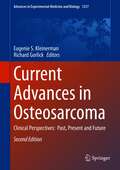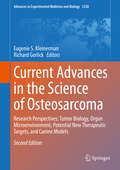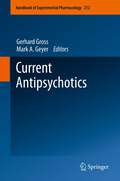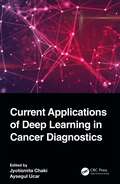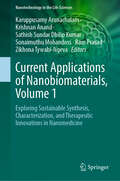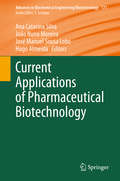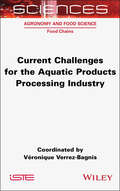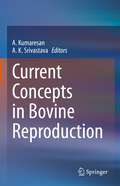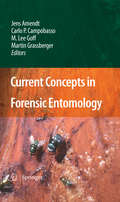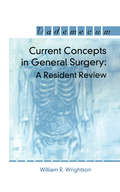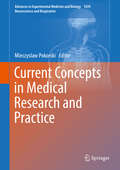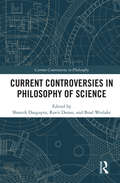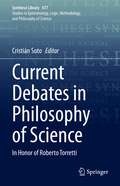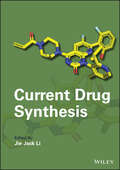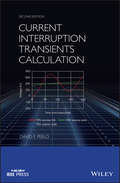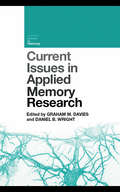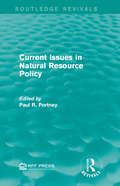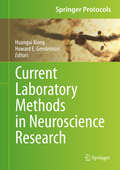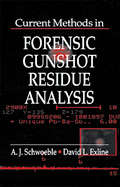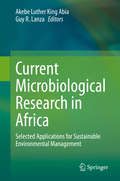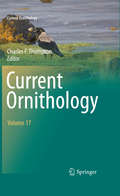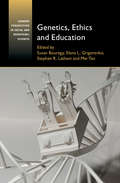- Table View
- List View
Current Advances in Osteosarcoma: Clinical Perspectives: Past, Present and Future (Advances in Experimental Medicine and Biology #1257)
by Eugenie S. Kleinerman Richard GorlickThis thoroughly revised second edition complied in 2 books is an up-to-date overview of the current clinical advances in sarcoma and osteosarcoma. The new edition features detailed, in-depth discussions of microRNAs in osteosarcoma, historical perspectives of chemotherapy in the treatment of the disease, tumor targeted IL12 therapy and HER2 targeted therapy, the role of enhancer elements in regulating the prometastatic transcriptional program and more. Further, these essential volumes also includes new insights on Wnt signaling in osteosarcoma, the role of genomics, genetically modified T-cell therapy, liquid biopsy, oncolytic viruses, immunophenotyping, receptor tyrosine kinases and epigenetic-focused approaches for treatment of osteosarcoma metastases, as well as thoughts on the current standard of treatment for patients suffering from these cancers. In the years since the previous edition, there have been numerous new developments in this rapidly changing field; this new edition is both timely and urgently needed. When taken together these companion volumes, Current Clinical (Book 1) and Scientific (Book 2) Advances in Osteosarcoma, are a timely and urgently needed guide for laboratory investigators and clinical oncologists focused in sarcoma.
Current Advances in the Science of Osteosarcoma: Research Perspectives: Tumor Biology, Organ Microenvironment, Potential New Therapeutic Targets, and Canine Models (Advances in Experimental Medicine and Biology #1258)
by Eugenie S. Kleinerman Richard GorlickThis thoroughly revised second edition is an up-to-date overview of the new advances in the knowledge of the basic science in sarcoma and osteosarcoma. It features detailed, in-depth discussions of microRNAs in osteosarcoma, historical perspectives of chemotherapy in the treatment of the disease, tumor targeted IL12 therapy and HER2 targeted therapy, the role of enhancer elements in regulating the prometastatic transcriptional program and more. Further, this essential volume also includes new insights on Wnt signaling in osteosarcoma, the role of genomics, genetically modified T-cell therapy, liquid biopsy, oncolytic viruses, immunophenotyping, receptor tyrosine kinases and epigenetic-focused approaches for treatment of osteosarcoma metastases, as well as thoughts on the current standard of treatment for patients suffering from these cancers. In the years since the previous edition, there have been numerous new developments in this rapidly changing field; this new edition is both timely and urgently needed. When taken together these companion volumes, Current Clinical (Book 1) and Scientific (Book 2) Advances in Osteosarcoma, are a timely and urgently needed guide for laboratory investigators and clinical oncologists.
Current Antipsychotics (Handbook of Experimental Pharmacology #212)
by Gerhard Gross Mark A. GeyerSix decades after the serendipitous discovery of chlorpromazine as an antipsychotic and four decades after the launch of clozapine, the first atypical or second generation antipsychotic, psychopharmacology has arrived at an important crossroad. It is clear that pharmacological research and pharmaceutical development must now focus on complementary or even alternative mechanisms of action to address unmet medical needs, i.e. poorly treated domains of schizophrenia, improved acceptance by patients, better adherence to medication, safety in psychoses in demented patients, and avoiding cardiac and metabolic adverse effects. The first completely novel mechanisms evolving from our insights into the pathophysiology of psychotic disorders, especially the role of glutamatergic mechanisms in schizophrenia, are now under development, and further principles are on the horizon. This situation, in many respects similar to that when the initial second-generation antipsychotics became available, can be rewarding for all. Preclinical and clinical researchers now have the opportunity to confirm their hypotheses and the pharmaceutical industry may be able to develop really novel classes of therapeutics. When we were approached by the publishers of the Handbook of Experimental Pharmacology to prepare a new volume on antipsychotics, our intention was to capture both, the accumulated preclinical and clinical knowledge about current antipsychotics as well as prospects for new and potentially more specific antischizophrenia principles. These efforts should be based on the pathophysiology of the diseases and the affected neurotransmitter systems. Since preclinical research on antipsychotic compounds is only reliable when intimately linked through translational aspects to clinical results, we decided to include clinical science as well. It turned out that that this endeavor could not be covered by a single volume. We thank the editorial board and the publishers for supporting our decision to prepare two volumes: Current Antipsychotics and Novel Antischizophrenia Treatments. These topics cannot really be separated from one another and should be seen as a composite entity despite the somewhat arbitrary separation of contributions into two volumes. The continuing challenges of developing improved and safer antipsychotic medications remain of concern and are discussed in the first volume. The new opportunities for the field to develop and license adjunctive treatments for the negative symptoms and cognitive deficits that are treated inadequately by existing compounds have been incentivized recently and provide the focus for the second volume. We hope these collective contributions will facilitate the development of improved treatments for the full range of symptomatology seen in the group of schizophrenias and other major psychotic disorders. Gerhard Gross, Ludwigshafen, Germany Mark A. Geyer, La Jolla, CA This volume will try to put current therapy - achievements, shortcomings, remaining medical needs - and emerging new targets into the context of increasing knowledge regarding the genetic and neurodevelopmental contributions to the pathophysiology of schizophrenia. Some of the chapters will also deal with respective experimental and clinical methodology, biomarkers, and translational aspects of drug development. Non-schizophrenia indications will be covered to some extent, but not exhaustively.
Current Applications for Overcoming Resistance to Targeted Therapies (Resistance to Targeted Anti-Cancer Therapeutics #20)
by Myron R. Szewczuk Bessi Qorri Manpreet SambiTargeted therapies were initially developed to exploit the upregulation and dependence on key oncogenic pathways critical to cancer progression. Additionally, they also presented as a method to overcome chemoresistance by supplementing conventional therapeutic regimens with targeted therapies. However, the development of resistance to these combinatorial approaches has led to the reassessment of currently available therapeutic options to overcome resistance to targeted therapy. This book aims to provide an update on the advancements in the therapeutic arms race between cancer, clinicians and scientists alike to overcome resistance to targeted therapies. Subject experts provide a comprehensive overview of the challenges and solutions to resistance to several conventional targeted therapies in addition to providing a discussion on broad topics including targeting components of the tumor microenvironment, emerging therapeutic options, and novel areas to be explored concerning nanotechnology and the epigenome.
Current Applications of Deep Learning in Cancer Diagnostics
by Jyotismita Chaki Aysegul UcarThis book examines deep learning-based approaches in the field of cancer diagnostics, as well as pre-processing techniques, which are essential to cancer diagnostics. Topics include introduction to current applications of deep learning in cancer diagnostics, pre-processing of cancer data using deep learning, review of deep learning techniques in oncology, overview of advanced deep learning techniques in cancer diagnostics, prediction of cancer susceptibility using deep learning techniques, prediction of cancer reoccurrence using deep learning techniques, deep learning techniques to predict the grading of human cancer, different human cancer detection using deep learning techniques, prediction of cancer survival using deep learning techniques, complexity in the use of deep learning in cancer diagnostics, and challenges and future scopes of deep learning techniques in oncology.
Current Applications of Nanobiomaterials, Volume 1: Exploring Sustainable Synthesis, Characterization, and Therapeutic Innovations in Nanomedicine (Nanotechnology in the Life Sciences)
by Ram Prasad Krishnan Anand Karuppusamy Arunachalam Sathish Sundar Dhilip Kumar Sonaimuthu Mohandoss Zikhona Tywabi-NgevaBiomaterials play a vital role in medicine today, including restoring function and facilitating diagnosis and disease prevention. Biomaterial-based products consist of either natural or synthetic materials. Biomaterials derived from natural products can consist of materials such as proteins, polysaccharides, lipids, glycoproteins, lipoproteins, cellular matrix, and its components. These products may be used as alternatives to animal-derived and synthetic chemical products to develop new therapeutic and diagnostic approaches with greater eco-friendliness and sustainability, according to new research. They are also biocompatible, biodegradable, renewable, non-toxic, and capable of remodelling. Recently, scientists have been exploring the potential use of plant-based cellular matrix-based biomaterials for the treatment of various communicable and noncommunicable diseases, a trend that has attracted the attention of global biomedical research. Globally, there has been an increase in the need for more effective treatment and diagnostics as a result of the overwhelming disease burden in society. Current Applications of Nanobiomaterials, Volume 1 and Volume 2 together, outline the most widely used biomaterials derived from non-animal natural resources, such as plants, fungi, algae, and microbes, with a focus on novel therapeutic and diagnostic applications.
Current Applications of Pharmaceutical Biotechnology (Advances in Biochemical Engineering/Biotechnology #171)
by Ana Catarina Silva João Nuno Moreira José Manuel Sousa Lobo Hugo AlmeidaThis book offers an authoritative review of biopharmaceuticals and their clinical relevance. Biopharmaceuticals have been showing high therapeutic potential by means of biological and biosimilar medicines, particularly for the treatment of cancer, chronic diseases (e.g. diabetes, Crohn's disease, psoriasis and rheumatoid arthritis), neurodegenerative disorders (e.g. multiple sclerosis), and they have also been contributing to the progress of innovative therapies such as assisted reproductive medicine. Since the eighties, several biopharmaceuticals have been approved and, due to patents expiration, many biosimilars are also marketed.In this book, readers will find the most relevant updated information about the main clinical applications of pharmaceutical biotechnology. The authors provide expert analysis about the industrial challenges of recombinant proteins and the different classes of biopharmaceuticals, including monoclonal antibodies, vaccines, growth factors and stem cells. Topics such as bioprinting technologies in tissue engineering, gene therapy and personalized medicine are also covered in this book. Professionals, students and researchers interested in this field will find this work an important account.
Current Aspects of Flavonoids: Their Role in Cancer Treatment
by Hardeep Singh TuliThe book comprehensively introduces readers to various aspects of flavonoids, a category of natural metabolites that exhibits various pharmacological effects. It discusses their chemistry, absorption and metabolism, mechanisms of action and toxicology as well as future perspectives for clinical applications, and also provides detailed insights into their anti-cancer properties, since flavonoids are known to modulate tumor-associated intracellular as well as extracellular signaling pathways. The book also highlights the current research on the health effects of selected flavonoids, and their various roles in cancer prevention and treatment. Lastly, the book elucidates nanotechnology-mediated tools to enhance the bioavailability and solubility of flavonoids to improve their bioactivity and pharmacokinetic parameters.
Current Challenges for the Aquatic Products Processing Industry
by Véronique Verrez-BagnisThis book offers a state-of-the-art analysis on the main challenges facing the aquatic products processing industry. The topics explored are particularly relevant to the issues faced by European consumers and processors, but the information provided within this book can be widely extrapolated. This book should be helpful for processors, fish traders, consumers, scientists and students. The first chapter is dedicated to the sociological definition of "fish" and consumers’ perceptions. The following chapters deal with the notions of quality sensu lato, biological risks and their control, as well as the risks linked to the pollution of oceans and ecosystems by microplastics. Two types of processes and processed products – smoked fish and surimi products – which are of great economic importance to the European market, are also presented. The process of adding value to co-products, including the "blue biorefinery" and the innovative pH-shift technology are also covered in this book.
Current Concepts in Bovine Reproduction
by A. Kumaresan A. K. SrivastavaThis book provides updated information on the current concepts in bovine reproduction. It describes the complex issues associated with fertility and infertility in bovines and suggests strategies for achieving high reproductive efficiency. It discusses topics related to the fertility trend in bovines, estrus detection, controlled breeding, postpartum uterine health, uterine infections, and its therapeutic management. The essential roles of metabolic hormones on gonadal functions and fertility are also covered. Additionally, the book presents new insights in maternal recognition of pregnancy in bovines and suggest nutritional strategies to improve reproductive efficiency. The chapters on male fertility provide current information on semen cryopreservation, sperm quality assessment and measures to improve sperm fertility. A special chapter on intricacies in buffalo semen cryopreservation and measures to improve the quality of cryopreserved sperm is also included in this book. Lastly, the book introduces the immunobiological roles of anti-microbial peptides during sperm transport in reproductive tract and epigenetic bearing on fertility. This book is an invaluable resource for veterinary scientists, students and practitioners to understand the current developments in bovine reproduction for improving reproductive efficiency.
Current Concepts in Forensic Entomology
by Carlo P. Campobasso M. Lee Goff Martin Grassberger Jens AmendtTwenty years ago the use of entomology in a crime scene investigation was considered bizarre, despite the solid scientific background and documented historical applications. Today, the use of insect evidence is an accepted sub-discipline in modern forensic science. Nevertheless, forensic entomology is still growing and remains a living scientific discipline with many branches. The present book highlights this diversity by collecting contributions dealing with novel aspects, for example, marine biology, chemical ecology and acarology, as well as the basic disciplines like entomotoxiciology and decomposition. It also offers keys for immature insects, discussions of important pitfalls and introductions to the statistical evaluation of data sets. Many topics are covered in depth for the first time. All the authors are leading experts in their respective fields of research. Their chapters show directions for future research for both new and veteran forensic entomologists. Undoubtedly, forensic entomology will continue to grow and attract new professionals, students, as well as interested observers. This book is written for all of them.
Current Concepts in General Surgery: A Resident Review
by William R. WrightsonThis book is designed to filter the medical minutia into an easy to read and follow text in General Surgery. As I went through my training in General Surgery, I found that as the in-service training exam approached I was never quite prepared. I just couldn't bring myself to read a 2000 page textbook the month before the exam. The Surgery Residents
Current Concepts in Medical Research and Practice (Advances in Experimental Medicine and Biology #1039)
by Mieczyslaw PokorskiChange is an inherent feature of all aspects of clinical practice and patient management. This book seeks to contribute to presenting novel knowledge in various fields of clinical work. The articles tackle transdisciplinary topics and focus on the underlying mechanisms of clinical disorders, their prevention and management. The themes addressed include allergy and pseudoallergy in the pediatric population, influenza-related infections and their sequelae, which continues to be a scourge in the developing world, the risk of lung cancer repeats and their management, viral hepatitis that may lead to hepatocarcinoma, respiratory consequences of diaphragmatic hernias, disorders of steroid hormone metabolism, and others. The articles bring the updated strategies, research, and best practices to improve outcomes and to deliver state-of-the-art clinical care to patients. The book will be of interest to physicians, academic scientists, and researchers who are keen in sharing the latest medical practice developments.
Current Controversies in Philosophy of Science (Current Controversies in Philosophy)
by Shamik DasguptaCurrent Controversies in Philosophy of Science asks twelve philosophers to debate six questions that are driving contemporary work in this area of philosophy. The questions are:I. Are Boltzmann Brains Bad?II. Does Mathematical Explanation Require Mathematical Truth?III. Does Quantum Mechanics Suggest Spacetime is Nonfundamental?IV. Is Evolution Fundamental When It Comes to Defining Biological Ontology?V. Is Chance Ontologically Fundamental?VI. Are Sexes Natural Kinds?These debates explore the philosophical foundations of particular scientific disciplines, while also examining more general issues in the philosophy of science. The result is a book that’s perfect for the advanced philosophy student, building up their knowledge of the foundations of the field and engaging with its cutting-edge questions. Preliminary descriptions of each chapter, annotated lists of further readings for each controversy, and study questions for each chapter help provide clearer and richer snapshots of active controversies for all readers.
Current Debates in Philosophy of Science: In Honor of Roberto Torretti (Synthese Library #477)
by Cristián SotoThis volume collects previously unpublished contributions to the philosophy of science. What brings them together is a twofold goal: first and foremost, celebrating the name of Roberto Torretti, whose works in this and other areas have had –and continue to have– a significant impact on the international philosophy of science community; and second, the desire of advancing novel perspectives on various issues in the philosophy of science broadly construed. Roberto Torretti has made substantial contributions to current debates in the history and philosophy of science, the general philosophy of science, and the philosophy of physics and geometry. Among his landmark contributions, we find his investigations in the history and philosophy of geometry, as well as his systematic studies of Einstein's relativity theory. This volume convenes leading philosophers and early-career scholars compiling a fine collection of chapters addressing recent debates on Kantian philosophy of science, the general philosophy of science, and the history and philosophy of physics and mathematics.
Current Drug Synthesis (Wiley Series on Drug Synthesis)
by Jie Jack Li GenHouse BioCurrent Drug Synthesis The latest entry in the widely read Drug Synthesis series In Current Drug Synthesis, accomplished medicinal chemist and researcher Dr. Jie Jack Li and 27 expert coauthors deliver an authoritative and comprehensive discussion of the medicinal chemistry of current drugs, as well as the cutting-edge science involved in their synthesis. The book demystifies the process of modern drug discovery for both industry practitioners and students, while capturing the state-of-the-art techniques used to discover some of the most impactful medicines on the market today. Covering six different disease areas – including infectious disease, cancer, cardiovascular and metabolic disease, the central nervous system, anti-inflammatory disease, and a miscellaneous section – the book explores 18 different drugs before concluding with chapters on computational drug discovery and peptide drugs. Each chapter includes coverage of background material on a relevant drug class or disease indication and key aspects of drug discovery, including structure-activity relationships, pharmacokinetics, drug metabolism, efficacy, and safety. Readers will also find: Thorough introductions to drugs for infectious diseases, including relebactam, vaborbactam, and baloxavir marboxil In-depth treatments of cancer-treating drugs, including darolutamide, venetoclax, and osimertinib Comprehensive explorations of central nervous system drugs, including zuranolone and risdiplam Extensive discussions of computational drug discovery and peptide drugs Perfect for medicinal, organic, synthetic, and process chemists, Current Drug Synthesis will also earn a place in the libraries of research scientists working in lead optimization and process development, as well as graduate students studying organic chemistry, heterocyclic chemistry, or medicinal chemistry.
Current Interruption Transients Calculation (Wiley - IEEE)
by David F. PeeloProvides an original, detailed, and practical description of current interruption transients, origins, and the circuits involved, and shows how they can be calculated Based on a course that has been presented by the author worldwide, this book teaches readers all about interruption transients calculation—showing how they can be calculated using only a hand calculator and Excel. It covers all the current interruption cases that occur on a power system and relates oscillatory circuit (transients) and symmetrical component theory to the practical calculation of current interruption transients as applied to circuit breaker application. The book explains all cases first in theory, and then illustrates them with practical examples. Topics featured in Current Interruption Transients Calculation, Second Edition include: RLC Circuits; Pole Factor Calculation; Terminal Faults; Short Line Faults; Inductive Load Switching; and Capacitive Load Switching. The book also features numerous appendices that cover: Differential Equations; Principle of Duality; Useful Formulae; Euler’s Formula; Asymmetrical Current-Calculating Areas Under Curves; Shunt Reactor Switching; and Generator Circuit Breaker TRVs. Offers a clear explanation of how to calculate transients without the use of specialist software, showing how four basic circuits can represent all transients Describes every possible current interruption case that can arise on a power system, explaining them through theory and practical examples Analyses oscillatory circuit (transients) and symmetrical component theory in detail Takes a practical approach to the subject so engineers can use the knowledge in circuit breaker applications Current Interruption Transients Calculation, Second Edition is an ideal book for power electrical engineers, as well as transmission and distribution staff in the areas of planning and system studies, switchgear application, specification and testing, and commissioning and system operation.
Current Issues in Applied Memory Research (Current Issues in Memory)
by Daniel B. Wright Graham M. DaviesResearch on applied memory is one of the most active, interesting and vibrant areas in experimental psychology today. This book provides descriptions of cutting-edge research and applies them to three key areas of contemporary investigation: education, the law and neuroscience. In the area of education, findings from the study of memory are described which could have a major impact on testing practice, revision techniques for examinations and teaching basic literacy and numeracy. In applications to the law, recent findings shed new light on the dynamics of child abuse investigations, the status of traumatic memories recovered after long delays and a further challenge for the eyewitness: change blindness. Finally, in neuroscience, contributions cover the frightening question of whether patients can remember incidents during surgical operations under anaesthetic, the unexpected impact of handedness and rapid eye movements on memory proficiency and the status of déjà vu: mystical experience or memory error? These accounts of recent research on applied memory have been written by leading experts in the field from both Europe and America, with the non-specialist in mind. They will interest students who wish to extend their reading beyond core material in cognitive psychology, graduates on more specialised courses in education, forensics and neuropsychology, and all those who wish to enrich their knowledge of the contemporary frontiers of applied memory research.
Current Issues in Natural Resource Policy (Routledge Revivals)
by Paul R. PortneyThis volume offers an objective view of some of the most critical issues in natural resources. Written in nontechnical language, it uses ideas drawn from economics to look at the issues, examine how government laws and policies have caused some of them arise, and to find ways in which problems can be lessened. Originally published in 1982, this is a valuable resource for students interested in environmental studies and public policy.
Current Laboratory Methods in Neuroscience Research (Springer Protocols Handbooks)
by Huangui Xiong Howard E. GendelmanCurrent Laboratory Methods in Neuroscience Research is a research manual for both students and seasoned researchers. It focuses on commonly-used techniques employed in neuroscience research, presented in a simple, step-by-step manner for laboratory use. The manual also offers a "blueprint" for bench-to-bedside research designed to facilitate multidisciplinary neuroscience pursuits. Sections include coverage of neurohistological techniques, in vitro preparations, leukocyte isolation and application in neuroscience, standard laboratory nucleic acid and protein detections, nanomedicine, bioimaging, neuroelectrophysiology, immunohistochemistry and autoradiography, analysis of gene expression, and animal models.
Current Methods in Forensic Gunshot Residue Analysis
by A. J. Schwoeble David L. ExlineWith the improvements in collection methods and analytical tools that allow more thorough analyses, gunshot residue examination has made a dramatic impact as an area of trace evidence essential to the investigation and prosecution of violent crime. Current Methods in Forensic Gunshot Residue Analysis deals with major areas of gunshot residue analysis, including current and future methods of analysis, collection techniques, interpretation of evidence, expert testimony and report writing. This text is a necessity for forensic scientists conducting this type of analysis and anyone involved in the investigation and prosecution of violent crimes involving firearms.
Current Microbiological Research in Africa: Selected Applications for Sustainable Environmental Management
by Guy R. Lanza Akebe Luther King AbiaScientific output in low- and middle-income countries is greatly challenged by numerous factors. This is particularly pronounced in sub-Saharan African countries, despite the continent being the world’s second largest and second most-populous continent, currently undergoing rapid economic growth. Financial constraints and unclear areas of focus when funding is available, are among the limiting factors, with the consequence being the development of inadequate policies, especially those relating to environmental protection and conservation.This 13-chapter book is a unique piece in the field of microbiology, designed to stimulate some research areas in Africa by illustrating interesting and informative examples of the current applied research agenda in environmental microbiology in selected countries within the continent. With authors from the North, South, East and West of Africa, the book touches diverse applied methods and approaches to meet the pragmatic needs faced by environmental microbiologists in Africa. Also included are topics on viruses, bacteria (including cyanobacteria), and protozoa, and their importance in disease. Sustainable agriculture and aquaculture, and eco-friendly oil and hydrocarbon bioremediation and degradation approaches are highlighted. Microbial involvement in different common indoor (e.g., household kitchens, latrines, and hospitals) and outdoor settings including air, soil, and water habitats, and their resistance to commonly used antibiotics, are described. Hopefully, the work presented here will stimulate the need for increasing modern training and funding initiatives to prepare African microbiologists to meet the challenges they face in African universities and research laboratories.
Current Ornithology Volume 17 (Current Ornithology #17)
by Charles F. ThompsonCurrent Ornithology publishes authoritative, up-to-date, scholarly reviews of topics selected from the full range of current research in avian biology. Topics cover the spectrum from the molecular level of organization to population biology and community ecology. The series seeks especially to review (1) fields in which an abundant recent literature will benefit from synthesis and organization, or (2) newly emerging fields that are gaining recognition as the result of recent discoveries or shifts in perspective, or (3) fields in which students of vertebrates may benefit from comparisons of birds with other classes. All chapters are invited, and authors are chosen for their leadership in the subjects under review.
Current Perspectives in Social and Behavioral Sciences: Genetics, Ethics, and Education (Current Perspectives in Social and Behavioral Sciences)
by Latham Stephen R. Susan Bouregy Grigorenko Elena L. Mei TanAdvances in human genetics and genomics are beginning to move outside the traditional realm of medicine and into the classroom. How will educational officials react when asked to incorporate personalized genomic information into the educational program? This volume bridges the divide between science, education and ethics around the emergent integration of genomics and education. By pairing comprehensive analysis of the issues with primers on the underlying science, the authors put all relevant parties on a level field to facilitate thorough consideration and educated discussion regarding how to move forward in this new era, as well as how best to support the future of education and the future of all students. The volume is unique in bringing together not only scholarly experts but also parents and laypersons. In doing so, it gives voice and understanding to a broad spectrum of disciplines that have a stake in the future of education.
Current Perspectives on the Functional Design of the Avian Respiratory System (Zoological Monographs #8)
by John N. MainaBirds have and continue to fascinate scientists and the general public. While the avian respiratory system has unremittingly been investigated for nearly five centuries, important aspects on its biology remain cryptic and controversial. In this book, resolving some of the contentious issues, developmental-, structural- and functional aspects of the avian lung-air sac system are particularized: it endeavors to answer following fundamental questions on the biology of birds: how, when and why did birds become what they are? Flight is a unique form of locomotion. It considerably shaped the form and the essence of birds as animals. An exceptionally efficient respiratory system capacitated birds to procure the exceptionally large quantities of oxygen needed for powered (active) flight. Among the extant air-breathing vertebrates, comprising ~11,000 species, birds are the most species-rich-, numerically abundant- and extensively distributed animal taxon. After realizing volancy, they easily overcame geographical obstacles and extensively dispersed into various ecological niches where they underwent remarkable adaptive radiation. While the external morphology of birds is inconceivably uniform for such a considerably speciose taxon, contingent on among other attributes, lifestyle, habitat and phylogenetic level of development have foremost determined the novelties that are displayed by diverse species of birds.Here, critical synthesizes of the most recent findings with the historical ones, evolution and behavior and development, structure and function of the exceptionally elaborate respiratory system of birds are detailed. The prominence of modern birds as a taxon in the Animal Kingdom is underscored. The book should appeal to researchers who are interested in evolutionary processes and how adaptive specializations correlate with biological physiognomies and exigencies, comparative biologists who focus on how various animals have solved respiratory pressures, people who study respiration in birds and other animals and ornithologists who love and enjoy birds for what they are – profoundly interesting animals.
